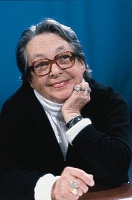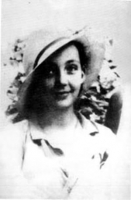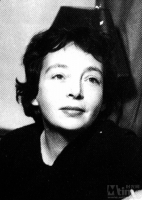阅读玛格丽特·杜拉斯 Marguerite Duras在小说之家的作品!!! | |||||||||||||||
1924年 她住在金边、永隆、沙沥。她母亲在波雷诺(柬埔寨)买了一块不能耕种的土地。
1939年 她同罗贝尔·昂泰尔姆结婚。
1940年-1942年 她同菲利普·罗克合作,在伽利玛出版社出版《法兰西帝国》。在书业俱乐部工作,《塔纳朗一家》遭到伽里玛出版社的拒绝。 她第一个孩子夭亡。她的小哥哥在中国抗日战争期间去世。同迪奥尼斯·马斯科洛相识。
1943年 她用玛格丽特·杜拉斯的笔名发表《无耻之徒》。参加莫尔朗(即弗朗索瓦·密特朗)领导的抵抗运动的活动。
1944年 R.昂泰尔姆被捕并被放逐到布亨瓦尔德,然后放逐到达豪(参见《痛苦》)。她加入法国,任维斯孔蒂街党支部书记,成立寻人处,出版《自由人报》,刊登战俘和被放逐者的情况材料。发表《平静的生活》。
1945年 R.昂泰尔姆回来。同R.昂泰尔姆一起成立万国出版社。 1946年她夏天在意大利。同R.昂泰尔姆离婚。
1947年 她的儿子让.马斯科洛出生。
1950年 她发表《抵挡太平洋的堤坝》。被开除出法国。
1957年 同D.马斯科洛分居。 1958年发表《琴声如诉》。她从1955年起反对继续进行阿尔及利亚战争,后又反对戴高乐政权。为各种周刊和杂志撰稿。
1959年 为阿兰.雷内写《广岛之恋》电影剧本。
1960年 当选为美第奇奖评委,但于几年后辞职。"如果存在一个否定的评委会,我就参加。"
1961年她为亨利.科尔皮的影片写《长别离》,这个电影剧本是同1963年美第奇文学奖获得者热拉尔.雅尔洛合作的结果。
1968年 她参加了五月风暴的那些事件。在《绿眼睛》中可读到关于大学生和作家行动委员会诞生的政论文,该文被委员会否定,委员会也在不久后解散。
1975年,《印度之歌》在戛纳电影节期间获法国艺术片影院及实验电影院协会奖。
1976年,《整天在树木之中》获让.科克托奖。
1982年 在纳伊的美国医院进行戒毒治疗。 1984年《情人》获龚古尔奖。
1985年 发表《痛苦》。 7月 17日在《解放报》上发表一篇文章,玛格丽特·杜拉斯在"魏尔曼案件"中所持的立场引起一部分读者的敌对情绪和好几位女权主义者的论战。
1986年 《情人》获里茨一巴黎一海明威奖,是"当年用英语发表的最佳小说"。
1988年-1989年 严重昏迷。住院。 1990年 R.昂泰尔姆去世。 1991年发表《来自中国北方的情人》。
1996年 玛格丽特·杜拉斯逝世。
Biography
She was born at Gia-Dinh, near Saigon, French Indochina (now Vietnam), after her parents responded to a campaign by the French government encouraging people to work in the colony.
Marguerite's father fell ill soon after their arrival, and returned to France, where he died. After his death, her mother, a teacher, remained in Indochina with her three children. The family lived in relative poverty after her mother made a bad investment in an isolated property and area of farmland in Cambodia. The difficult life that the family experienced during this period was highly influential on Marguerite's later work. An affair between the teenaged Marguerite and a Chinese man was to be treated several times (described in quite contrasting ways) in her subsequent memoirs and fiction. She also reported being beaten by both her mother and her older brother during this period.
At 17, Marguerite went to France, her parents' native country, where she began studying for a degree in law. This she soon abandoned to concentrate on political sciences, and then law. After completing her studies, she became an active member of the PCF (the French Communist Party). In the late 1930s she worked for the French government office representing the colony of Indochina. During the war, from 1942 to 1944, she worked for the Vichy government in an office that allocated paper to publishers (in the process operating a de facto book censorship system), but she was also a member of the French Resistance. Her husband Robert Antelme was deported to Bergen-Belsen for his involvement in the Resistance, and barely survived the experience (weighing on his release, according to Marguerite, just 84 lbs).
In 1943 she changed her surname to Duras, the name of a village in the Lot-et-Garonne département, where her father's house was located.
She is the author of many novels, plays, films, interviews, essays and short fiction, including her best-selling, apparently autobiographical work L'Amant (1984), translated into English as The Lover. This text won the Goncourt prize in 1984. The story of her adolescence also appears in three other forms: The Sea Wall, Eden Cinema and The North China Lover. A film version of The Lover, produced by Claude Berri, was released to great success in 1992.
Other major works include Moderato Cantabile, also made into a film of the same name, Le Ravissement de Lol V. Stein, and her play India Song, which Duras herself later directed as a film (1975). She was also the screenwriter of the 1959 French film Hiroshima mon amour, which was directed by Alain Resnais.
Duras's early novels were fairly conventional in form (their 'romanticism' was criticised by fellow writer Raymond Queneau); however, with Moderato Cantabile she became more experimental, paring down her texts to give ever-increasing importance to what was not said. She was associated with the Nouveau roman French literary movement, although she did not belong definitively to any group. Her films are also experimental in form; most eschew synchronized sound, using voice over to allude to, rather than tell, a story; spoken text is juxtaposed with images whose relation to what is said may be more-or-less indirect.
Despite her success as a writer, Duras's adult life was also marked by personal challenges, including a recurring struggle with alcoholism. Duras died of throat cancer in Paris, aged 81. She is interred in the Cimetière du Montparnasse.
Bibliography
* Les Impudents, Plon, 1943
* La Vie tranquille, Gallimard, 1944.
* Un barrage contre le Pacifique, Gallimard, 1950 (tr. The Sea Wall, 1967)
* Le Marin de Gibraltar, Galimard, 1952 (tr. The Sailor from Gibraltar, 1966)
* Les petits chevaux de Tarquinia, Gallimard, 1953 (tr. The Little Horses of Tarquinia, 1960)
* Des journées entières dans les arbres, "Le Boa", "Madame Dodin", "Les Chantiers", Gallimard, 1954 (tr. Whole Days in the Trees, 1984)
* Le Square, Gallimard, 1955 (tr. The Square, 1959)
* Moderato Cantabile, Les Éditions de Minuit, 1958 (tr. Moderato Cantabile, 1977)
* Les Viaducs de la Seine et Oise, Gallimard, 1959.
* Dix heures et demie du soir en été, Paris, 1960 (tr. Ten-Thirty on a Summer Night, London, 1961)
* Hiroshima mon amour, Gallimard, 1960 (tr. Hiroshima mon amour, 1961)
* L'après-midi de M. Andesmas, Gallimard, 1960 (tr. The Afternoon of Mr. Andesmas, 1964)
* Le Ravissement de Lol V. Stein, Gallimard, 1964, (tr. The Ravishing of Lol Stein, 1964)
* Théâtre I : les Eaux et Forêts-le Square-La Musica, Gallimard, 1965 (tr. The Rivers and the Forests, 1964; The Square; La Musica, 1975)
* Le Vice-Consul, Gallimard, 1965 (tr. The Vice-Consul, 1968)
* L'Amante Anglaise, Gallimard, 1967 (tr. L'Amante Anglaise, 1968)
* Théâtre II : Suzanna Andler-Des journées entières dans les arbres-Yes, peut-être-Le Shaga-Un homme est venu me voir, Gallimard, 1968.
* Détruire, dit-elle, Les Éditions de Minuit, 1969 (tr. Destroy, She Said)
* Abahn Sabana David, Gallimard, 1970.
* L'Amour (Love), Gallimard, 1971.
* Ah! Ernesto, Hatlin Quist, 1971.
* India Song, Gallimard, 1973 (tr. India Song, 1976)
* Nathalie Granger, suivi de "La Femme du Gange", Gallimard, 1973.
* Le Camion, suivi de "Entretien avec Michelle Porte", Les Éditions de Minuit, 1977.
* L'Eden Cinéma, Mercure de France, 1977 (tr. Eden Cinema, 1992)
* Le Navire Night, suivi de Cesarée, les Mains négatives, Aurélia Steiner, Mercure de France, 1979.
* Vera Baxter ou les Plages de l'Atlantique, Albatros, 1980.
* L'Homme assis dans le couloir, Les Éditions de Minuit, 1980 (tr. The Man Sitting in the Corridor)
* L'Été 80, Les Éditions de Minuit, 1980.
* Les Yeux verts, Cahiers du cinéma, n.312-313, juin 1980 et nouvelle édition, 1987 (tr. Green Eyes)
* Agatha, Les Éditions de Minuit, 1981 (tr. Agatha)
* Outside, Albin Michel, 1981 (tr. Outside)
* L'Homme atlantique, Les Éditions de Minuit, 1982.
* Savannah Bay, Les Éditions de Minuit, 1982, 2ème edition augmentée, 1983 (tr. Savannah Bay, 1992)
* La Maladie de la mort, Les Éditions de Minuit, 1982 (tr. The Malady of Death)
* Théâtre III : -La Bête dans la jungle, d'après H. James, adaptation de J. Lord et M. Duras,-Les Papiers d'Aspern,d'après H. James, adaptation de M. Duras et R. Antelme,-La Danse de mort, d'après A. Strindberg, adaptation de M. Duras, Gallimard, 1984.
* L'Amant, Les Éditions de Minuit, 1984. Was awarded the 1984 Prix Goncourt (tr. The Lover)
* La Douleur, POL, 1985 (tr. The War)
* La Musica deuxième, Gallimard, 1985.
* Les Yeux bleus Cheveux noirs, Les Éditions de Minuit, 1986 (tr. Blue Eyes, Black Hair)
* La Pute de la côte normande, Les Éditions de Minuit, 1986.
* La Vie matérielle, POL, 1987 (tr. Practicalities)
* Emily L., Les Éditions de Minuit, 1987 (tr. Emily L.)
* La Pluie d'été, POL, 1990 (tr. Summer Rain)
* L'Amant de la Chine du Nord, Gallimard, 1991 (tr. The North China Lover, 1992)
* Yann Andréa Steiner, Gallimard, 1992 (tr. Yann Andrea Steiner)
* Écrire, Gallimard, 1993
* C'est tout, POL, 1995 (tr. No More)
Filmography as director
* Les Enfants (1984)
* Il Dialogo di Roma (1982)
* L'Homme atlantique (1981)
* Agatha et les lectures illimitées (1981)
* Aurelia Steiner (Melbourne) (1979)
* Aurélia Steiner (Vancouver) (1979)
* Le Navire Night (1979)
* Cesarée (1978)
* Les Mains négatives (1978)
* Baxter, Vera Baxter (1977)
* Le Camion (1977)
* Des journées entières dans les arbres (1976)
* Son nom de Venise dans Calcutta désert (1976)
* India Song (1975)
* La Femme du Gange (1974)
* Nathalie Granger (1972)
* Jeune le soleil (1972)
* Détruire, dit-elle (1969)
* La Musica (1967)


